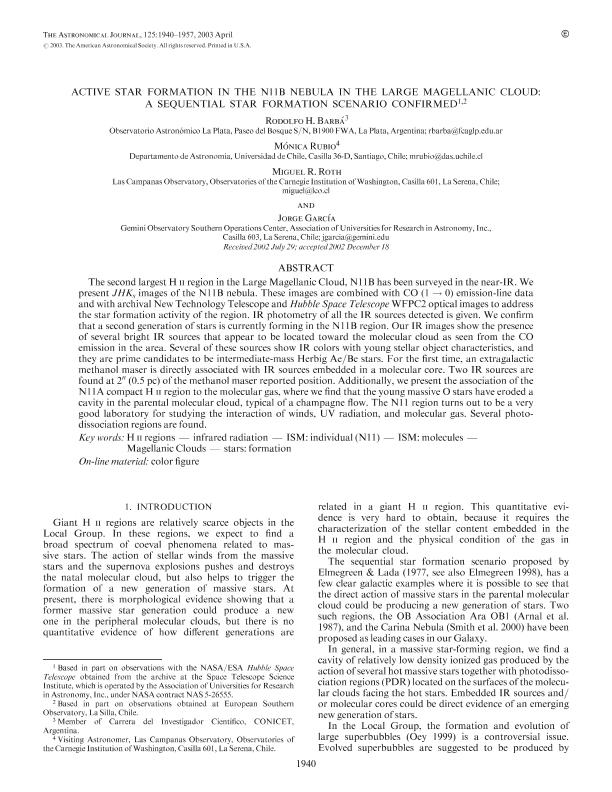Mostrar el registro sencillo del ítem
dc.contributor.author
Barba, Rodolfo Héctor

dc.contributor.author
Rubio, Mónica
dc.contributor.author
Roth, Miguel R.
dc.contributor.author
Garcia, Jorge
dc.date.available
2023-10-11T12:52:08Z
dc.date.issued
2003-12
dc.identifier.citation
Barba, Rodolfo Héctor; Rubio, Mónica; Roth, Miguel R.; Garcia, Jorge; Active Star Formation in the N11B Nebula in the Large Magellanic Cloud: A Sequential Star Formation Scenario Confirmed; IOP Publishing; Astronomical Journal; 125; 125 ; 12-2003; 1940-1957
dc.identifier.issn
0004-6256
dc.identifier.uri
http://hdl.handle.net/11336/214791
dc.description.abstract
The second largest H II region in the Large Magellanic Cloud, N11B has been surveyed in the near-IR. We present JHKs images of the N11B nebula. These images are combined with CO (1-->0) emission-line data and with archival New Technology Telescope and Hubble Space Telescope WFPC2 optical images to address the star formation activity of the region. IR photometry of all the IR sources detected is given. We confirm that a second generation of stars is currently forming in the N11B region. Our IR images show the presence of several bright IR sources that appear to be located toward the molecular cloud as seen from the CO emission in the area. Several of these sources show IR colors with young stellar object characteristics, and they are prime candidates to be intermediate-mass Herbig Ae/Be stars. For the first time, an extragalactic methanol maser is directly associated with IR sources embedded in a molecular core. Two IR sources are found at 2" (0.5 pc) of the methanol maser reported position. Additionally, we present the association of the N11A compact H II region to the molecular gas, where we find that the young massive O stars have eroded a cavity in the parental molecular cloud, typical of a champagne flow. The N11 region turns out to be a very good laboratory for studying the interaction of winds, UV radiation, and molecular gas. Several photodissociation regions are found.
dc.format
application/pdf
dc.language.iso
eng
dc.publisher
IOP Publishing

dc.rights
info:eu-repo/semantics/openAccess
dc.rights.uri
https://creativecommons.org/licenses/by-nc-sa/2.5/ar/
dc.subject
N11B Nebula
dc.subject
MAGELLANIC CLOUD
dc.subject
A SEQUENTIAL STAR
dc.subject.classification
Astronomía

dc.subject.classification
Ciencias Físicas

dc.subject.classification
CIENCIAS NATURALES Y EXACTAS

dc.title
Active Star Formation in the N11B Nebula in the Large Magellanic Cloud: A Sequential Star Formation Scenario Confirmed
dc.type
info:eu-repo/semantics/article
dc.type
info:ar-repo/semantics/artículo
dc.type
info:eu-repo/semantics/publishedVersion
dc.date.updated
2023-07-07T20:32:12Z
dc.journal.volume
125
dc.journal.number
125
dc.journal.pagination
1940-1957
dc.journal.pais
Reino Unido

dc.description.fil
Fil: Barba, Rodolfo Héctor. Consejo Nacional de Investigaciones Científicas y Técnicas. Centro Científico Tecnológico Conicet - San Juan. Instituto de Ciencias Astronómicas, de la Tierra y del Espacio. Universidad Nacional de San Juan. Instituto de Ciencias Astronómicas, de la Tierra y del Espacio; Argentina
dc.description.fil
Fil: Rubio, Mónica. Universidad de Chile; Chile
dc.description.fil
Fil: Roth, Miguel R.. Observatories of the Carnegie Institution of Washington; Chile
dc.description.fil
Fil: Garcia, Jorge. Association of Universities for Research in Astronomy; Chile
dc.journal.title
Astronomical Journal

dc.relation.alternativeid
info:eu-repo/semantics/altIdentifier/url/https://iopscience.iop.org/article/10.1086/368141
dc.relation.alternativeid
info:eu-repo/semantics/altIdentifier/doi/http://dx.doi.org/10.1086/368141
Archivos asociados
